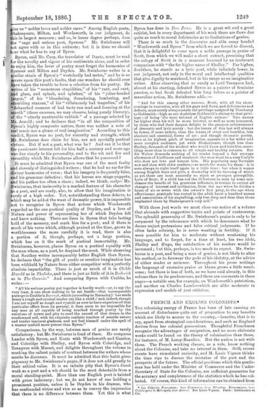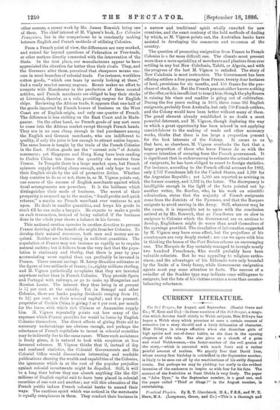FRENCH AND ENGLISH COLONISTS.*
THE colonising energy of France has been of late causing an amount of disturbance quite out of proportion to any benefits which are likely to accrue to the country,—benefits, that is to say, apart from strategical considerations, and such as England derives from her colonial possessions. Thoughtful Frenchmen recognise the advantages of emigration, and no more elaborate works could be found on the theory of colonisation than those, for instance, of M. Leroy-Beaulieu. But the nation is not with them. The French working classes, as a rule, know nothing about the Colonies, and take no interest in them. Still, recent events have stimulated curiosity, and M. Louis Vignon thinks the time ripe to discuss the mistakes of the past and the prospects of the future. The official positions which this gentle- man has held under the Minister of Commerce and the Under- Secretary of State for the Colonies, are sufficient guarantee for the accuracy and completeness of the statistics which he has col- lected. Of coarse, this kind of information can be obtained from • Les Colonies Francesists: leur Lear Situation Econontique, teur ITtilite pour la metropols,leur dontir. Par Louis Viguon. Paris Guillanusin et Cie.
other sources, a recent work by Mr. James Bonwick being one of them. The chief interest of M. Vignola's book, Les Colonies Francaises, lies in the comparisons he is constantly making between English and French methods of utilising Colonies.
From a French point of view, the differences are very marked, and extend far beyond questions of Federation or Free-trade, or other matters directly connected with the intervention of the State. In the first place, our manufacturers appear to have appreciated the situation far better than their rivals. They, and the Germans after them, perceived that cheapness means suc- cess in most branches of colonial trade. For instance, worthless cotton goods, "which one tears by merely looking at them," find a ready market among negroes. Rouen makes no effort to compete with Manchester in the production of these coveted articles, and French merchants are obliged to buy their stocks at Liverpool, thereby, as a. rule, providing cargoes for English ships. Reviewing the African trade, it appears that one-half of the goods imported by French houses of business on the West Coast are of English origin, and only one quarter of French. The difference is less striking on the East Coast and in Mada- gascar. On the other hand, no French goods of any sort seem to come into the African market except through French hands. They are in no case cheap enough to find purchasers among the English and German merchants, who are indifferent to quality, if only the price is low enough to attract native buyers. The same lesson is taught by the trade of the French Colonies in the East. Cotton .goods are the current coin" of Asiatic commerce; yet Singapore and Hong Kong have been sending to Cochin China ten times the quantity she receives from France. In Tonquin there is a large market open, but French spinners supply nothing cheap enough, and only hope to oust their English rivals by the aid of protective duties. Whether they contrive to do so or not, there is, as M. 'Vignola points out, one source of the success of English merchants against which fiscal arrangements are powerless. It is the boldness which distinguishes their mode of business. The secret of their prosperity is summed up in the maxim, "Small profits and quick returns," a maxim no French merchant ever ventures to act upon. He deals in smaller quantities, and keeps his goods in stock till he can make a bargain. He expects to make a profit on each transaction, instead of being satisfied if the business done in the whole year shows a balance in his favour. '
This national caution operates in another direction to prevent France deriving all the benefit she might from her Colonies. To develop their natural resources, bath men and money are re- quired. Neither are forthcoming in sufficient quantities. The population of France may not increase so rapidly as to require natural outlets ; bat it follows from the very fact that the popu- lation is stationary and thrifty, that there is year by year accumulating more capital than can profitably be invested in France. These annual savings M. Leroy-Beauliea estimates at the figure of two milliards of francs, i.e., eighty millions sterling, and M. Vignon pathetically complains that they are invested anywhere rather than in French Colonies. They provide Spain and Portugal with railways, or go to make up Hungarian and Russian Loans. The interest they thus bring in at present is 51 per cent. at the outside. Yet in Senegal and other Colonies, there are banks paying dividends ranging from 1E4 to 121 per cent, on their nominal capital ; and the peasant.
proprietor of Cochin China is giving 3 or 4 per cent. per month for the loans, with which rich Chinese or Annamites supply him. M. Vignon repeatedly points out how many of the expenses which France provides for would be borne by English Colonies themselves. The direct effects of giving State aid to necessary undertakings are obvious enough, and perhaps the reluctance of French capitalists to invest in colonial securities may be indirectly due to the same cause. Where such assistance is freely given, it is natural to look with suspicion at less favoured schemes. M. Vignon thinks that if, instead of dry and confused statistics, the Colonial Governments and the Colonial Office would disseminate interesting and readable publications showing the wealth and capabilities of the Colonies, the ignorance which is at the root of the popular prejudice against colonial investments might be dispelled. Still, it will be a long time before they can absorb anything like the 620 millions of English capital said to have been placed in colonial securities of one sort and another ; nor will this education of the French public induce French colonial banks to amend their ways. The cautious spirit which was noticed in the merchants is equally conspicuous in them. They conduct their business in a narrow and traditional spirit wholly unsuited for new countries, and the exact contrary of the bold methods of dealing by which, as M. Vignon points out, the Australian banks have assisted in developing the commerce and resources of the country.
Tha question of promoting emigration from France to Frenph Colonies is a far more difficult one. The climate must prevent more than a mere sprinkling of merchants and planters from ever settling in any but New Caledonia, Tahiti, or Algeria, and with the progress of the last M. Vignon is satisfied. The story of New Caledonia is most instructive. The Government has been offering settlers a free passage from France, twenty-four hectares of land, provisions for six months, and 150 francs for the pur- chase of stock, &c. But the French peasant either knows nothing of the offer, or it is insufficient to tem, t him, though the phylloxera is ruining his vines and madder is going out of cultivation. During the five years ending in 1833, there came 382 English emigrants, probably from Australia, but only 330 French settlers, and the Colony would have been better without many of them. The penal element already established is no doubt a most powerful deterrent, and M. Vignon, though deploring the way in which a great opportunity has been missed- in not applying convict-labour to the making of roads and other necessary works, thinks that there is too large a proportion present for the best interests of the Colony. It seems to us that here, as elsewhere, M. Vignon overlooks the fact that a large proportion of those who leave France do' so with the express intention of escaping from the French government. It is significant that in endeavouring to estimate the actual number of emigrants, he has been obliged to resort to foreign statistics. For instance, according to the French official account for 1882, only 2,737 Frenchmen left for the United States, and 1,189 for the Argentine Republic ; yet 5,560 are reported as arriving in the former country, and 3,382 in the latter. The discrepancy is intelligible enough in the light of the facts pointed out by. ' another writer, Dr. Bordier, who, in his work on scientific colonisation, states that the majority of French -emigrants come from the districts of the Pyrenees, awl that the Basques emigrate to avoid serving in the Army. Still, whatever max be the cause, it is impossible not to agree with the conclusion arrived at by Mr. Bonwick, that as Frenchmen are so slow to emigrate to Colonies which the Government are so anxious to develop, Englishmen might do worse than avail themselves of the openings provided. The circulation of information suggested by M. Vignon may have some effect, but the prejudices of his countrymen are very deeply rooted ; nor can we agree with him in thinking the lesson of the Port Breton scheme an encouraging one. The Marquis de Ray certainly managed to inveigle nearly two hundred Frenchmen, 4rho would probably have been valuable colonists. But he was appealing to religious enthu- siasm, and the advantages of his Eldorado were only bounded by the limits of a lively fancy, while Government emigration. agents must pay some attention to facts. The success of a swindler of the Scadder type may indicate some willingness to emigrate, but the fate of his victims creates a more than counter- balancing reluctance.



































 Previous page
Previous page